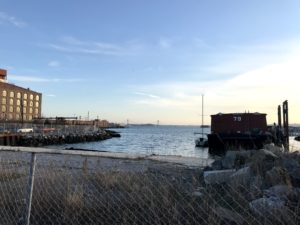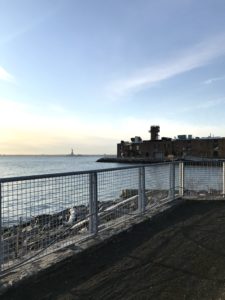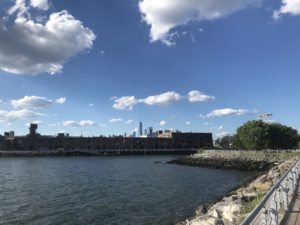Long Walks with Waxahatchee
At the start of the pandemic, somewhere around mid-March, I started taking long walks after work. With routines not just interrupted but in complete tatters, I set a new one for myself, tracing my own map of Brooklyn with nothing but my stride.
I’d sign off my computer, grab my over ear headphones, and cast off for some direction that felt fitting that day: north to Brooklyn Heights, east to Prospect Park, south(ish) to Windsor Terrace, or west to Red Hook. Those early months were noticeably empty in the evenings, and the city felt heavy with despair. Walking became my way through, a means of treading water until I could escape the rip tide pulling me away from shore.
 Eventually my initial compass whittled down from four points to simply north and west—the latter far more than the former. Red Hook became the escape. I didn’t know it at the time, but I sought the water.
Eventually my initial compass whittled down from four points to simply north and west—the latter far more than the former. Red Hook became the escape. I didn’t know it at the time, but I sought the water.
Maybe your origins have little to do with your affinity to being by water—after all, it does seem almost primitive to enjoy that part of nature—but I thank my early years on Toronto’s lakeside beaches and extensive time at my grandparents’ cottage on Lake Nipissing with shaping my craving for lakes, rivers, oceans, and all manner of watery expanse. The lap of the water—its soothing, steadying rhythm—satisfies some yearning in me that never fully stills.
It was in the spring pandemic months that Waxahatchee‘s album Saint Cloud arrived. It showed up at the perfect time, which was also somehow the hardest, so I guess Dickens called it after all. Initially, I tried out many different songs for those long walks, but only something brand new would do—a blank canvas on which to paint the experience of an unfolding global crisis, and its devastating impact on the city.

The country-influenced, Americana-leaning album marked a departure from singer-songwriter Katie Crutchfield’s previous work as Waxahatchee: her dark, growling rock on 2017’s Out in the Storm; her electrifying Merge debut, 2015’s Ivy Tripp; and her previous two lo-fi LPs. Saint Cloud felt capacious and warm. From the way her protracted vocals take up space on the opening track “Oxbow,” I felt a hesitant flowering that shifted into a steady assurance, as if Crutchfield had crossed her arms, raised her chin, and was staring you down in the parking lot. I needed that grit at the time.
The album dealt largely in her new sobriety, a choice she feared would limit her songwriting potential, but instead maximized it. Without the numbing haze that had followed her around, Crutchfield stumbled into a bright-eyed wonder. The album sounds like golden hour—that magic time of day when the setting sun’s waning light softens everything it touches.
“Lilacs” remains a standout for me—a song about the passage of time, about watching its ebb and flow by way of something’s bloom and decline, and how that circularity plays out on the larger stage of our choices. “If I’m a broken record, write it in the dust, babe/ I’ll fill myself back up like I used to do,” she sings, her voice full of vim and vigor.
Even though Crutchfield wrote and recorded the album before a pandemic crossed anyone’s mind, her culminating song and title track “St. Cloud” is oddly prescient, especially given the context in which I first listened to it. Though a good deal of Saint Cloud situates Crutchfield in her native south, the final two songs return her to Manhattan.
On “St. Cloud,” she sings, with an almost dirge-like piano structuring her vocals, “When you get back on the M train/ Watch the city mutate/ Where do you go when your mind starts/ To lose its perfected shape?/ Virtuosic, idealistic, musing a fall from grace/I guess the dead just go on living/ At the darkest edge of space.” That last line in particular haunted the moment. We’d lost over 30,000 New Yorkers between March and May, yet their deaths felt strangely abstract. Stuck as we were in our tiny boxes, we had only the endless wails of the ambulance sirens to alert us to the growing toll. “St. Cloud” gave voice to the grief—it feels like a memorial written in real time.
Beyond the emergency of the larger moment, everything felt in disarray. I was close to ending the most stable relationship I’d known. Although we’d been looking for an apartment together since November—a serious step forward with light talk of marriage fluttering at the edges—things had taken a strange nosedive in January and our recovery hadn’t come close to stabilizing when the pandemic hit. I asked for time apart and those long walks clarified our approaching end. “Arkadelphia” just handed me the sentiment, the way, if you’re lucky, a song will articulate a hazy feeling: “If you get real close to the ending/ I hope you know I did what I could/ We try to give it all meaning/ Glorify the grain of the wood/ Tell ourselves what’s beautiful and good.”
What’s wild, and entirely my fault, is that as much as I love the album, I have to choose my re-listens carefully because I’m immediately taken back to those late March walks when the world was falling apart—both the larger instance of it and my own personal version. I imagine that will fade with time, though who knows; perhaps the needle in this particular groove goes too deep and Saint Cloud will always be my long-haunted-pandemic-treks-to-Red-Hook album. There are worse appellations, I suppose.

I want to say something profound about that experience one year ago. I even brought my laptop over to Wilmington, where I recently rented a docked sailboat; I thought the meaning would become clearer when I sought out water and listened to the album in full once again. But be careful about drawing parallels, about tracing the line between here and there, once and was. You can walk the maps you create for yourself, but that doesn’t mean they’ll reveal a point. I’ll leave it, instead, to Crutchfield: “If you burn slow, burning slow/ On your own roof, yell what you know/ Burning slow, burning slow.”

